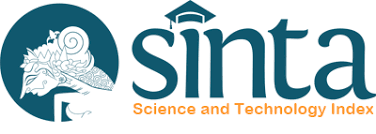Pengolahan Sampah Organik Menjadi Eco-Enzym Untuk Meningkatkan Ekonomi Kreatif Kelompok PKK Petukangan Jakarta Selatan
Abstract
Turning waste into gold, something valuable for survival is determined by understanding (mindset), appreciation (internalization), and way of life (way of life) as intelligent and virtuous human beings interconnected with the environment in which we live need clean air without any waste. Environmental problems caused by piles of garbage and sources of disease that disturb the view, this can be handled properly slowly but surely, and sustainably, Through community service with hands-on practical assistance in processing organic waste into Eco-Enzyme for group partners PKK Rw 06 Petukangan Selatan, South Jakarta. The solution was made using the method of processing fruit and vegetable waste mixed with water and palm sugar using the ratio of organic waste: palm sugar: water = 3: 1: 10. The mixture was put in a plastic bottle or barrel, and fermented anaerobically for 3 (three) month. Eco-Enzyme is a dangerous synthetic chemical at home, by making Eco-Enzyme we can reduce the production of synthetic chemical waste from manufactured household waste. The results of the fermented Eco-Enzyme liquid can be used for various applications such as cleaning fluids for household furniture, detergents, leather cleaners, for water purification and deodorizing, for food preservation, as insecticides and pesticides, agriculture, (watering plants and improve the quality of fruit in horticulture), animal husbandry (eliminates fishy odors in the aquarium while making fish healthy), cleaning the floor of the house, for health (reaction by soaking feet in warm water mixed with Eco Enzyme, purifies the air in the room, cleanses the body, mouthwash, natural hand sanitizer.With Eco-Enzyme we have participated in reducing the burden on the earth while adopting a healthy lifestyle.
Downloads
References
Budiyanto, C. W., Yasmin, A., Fitdaushi, A. N., Rizqia, A. Q. S. Z., Safitri, A. R., Anggraeni, D. N., Farhana, K. H., Alkatiri, M. Q., Perwira, Y. Y., & Pratama, Y. A. (2022). Mengubah Sampah Organik Menjadi Eco Enzym Multifungsi: Inovasi di Kawasan Urban. DEDIKASI: Community Service Reports, 4(1), 31–38. https://doi.org/10.20961/dedikasi.v4i1.55693
Dewi Syarifah, R., Amini, H. W., Nihayah, H., & Luthfiyana, N. U. (2022). Trash can-composter: alat pencacah sampah organik untuk pencacah sampah limbah pertanian. 6(3), 1712–1721.
Ekawati, N., Cahyati, A., Kunci, K., Sampah, P., Lingkungan Hidup Dalam Keluarga, P., & Kang Pisman, G. (2020). Environmental Education (Eco Education) in the Family Through the Kang Pisman Movement. Jurnal Pendidikan Islam, 9(2), 151–164.
Haluty, D. (2020) Islam Dan Manajemen Sumber Daya Manusia Yang Berkualitas. Jurnal Irfani, 74, 63–74.
Indah Sari, V., Susi, N., & Rizal, M. (2021). Pelatihan Pemanfaatan Sampah Organik Sebagai Bahan Eco-Enzym Untuk Pembuatan Pupuk Cair, Desinfektan Dan Hand Sanitizer. COMSEP: Jurnal Pengabdian Kepada Masyarakat, 2(3), 323–330. https://doi.org/10.54951/comsep.v2i3.164
Junaidi, Zaini, Ramadhan, Hasan, Ranti, Firmansyah, Umayasari, Sulistyo, Aprilia, & Hardiansyah. (2021). IbM Membuat Eco Enzym dengan Memanfaatkan Limbah Organik Rumah Tangga di Bank Sampah Berkah Abadi Kelurahan Limbungan Kecamatan Rumbai Timur. Prosiding Seminar Nasional Pengabdian Kepada Masyarakat Universitas Lancang Kuning, 3(3), 8–13.
Nurliah, N., Elika, S., & Sagena, U. W. (2022). Sosialisasi Pengelolaan dan Pemanfaatan Sampah Organik Rumah Tangga Dalam Memproduksi Ekoenzim. Jurnal Pengabdian Masyarakat Madani (JPMM), 2(1), 33–39. https://doi.org/10.51805/jpmm.v2i1.47
Pranata, L., Kurniawan, I., Indaryati, S., Rini, M. T., Suryani, K., & Yuniarti, E. (2021). Pelatihan Pengolahan Sampah Organik Dengan Metode Eco Enzym. Indonesian Journal Of Community Service, 1(1), 171–179. http://ijocs.rcipublisher.org/index.php/ijocs/article/view/23
Rahayu, N. I., Candra, M., & Zalukhu, P. S. (2022). Pengolahan Sampah Organik Rumah Tangga Menjadi Pupuk Ramah Lingkungan Kelurahan Simpang Baru. Jurnal Pengabdian UntukMu NegeRI, 6(1), 180–186. https://doi.org/10.37859/Jpumri.V6i1.3207
Roisah, N. L. (2022). Metode Pengelolaan Sampah Rumah Tangga: Survey Keperawatan Kesehatan Komunitas Di Area Pedesaan Kabupaten Probolinggo Jawa Timur Ro’isah 1) , Nurul Laili 2) 1). 7(2), 101–108.
Rustanta, A., Jaya, A. S., & Graciella, M. (2022). Pemberdayaan Masyarakat Melalui Budidaya Eco-Enzym Di Bekasi Selatan. JMM (Jurnal Masyarakat Mandiri), 6(4), 3360. https://doi.org/10.31764/jmm.v6i4.9776
Sujarta, P., & Simonapendi, M. L. (2021). Pelatihan Pengolahan Sampah Organik Dengan Konsep Eco-Enzym. Jurnal Pengabdian Papua, 5(1), 34–39. https://doi.org/10.31957/.v5i1.1326
Suryani, W., Margery, E., Manajemen, P. S., Manajemen, P. S., Area, U. M., & Manajemen, P. S. (2020). Pelatihan pembuatan eco enzym dari sampah rumah tangga buah dan sayuran dan pemasaran produk yang dihasilkan dari eco enzym melalui media sosial. Jurnal Layanan Masyarakat (Journal of Public Services), 4(1), 91. https://jurnalpkmibbi.org/index.php/Pubarama/article/view/3%0Ahttp://www.jurnalpkmibbi.org/index.php/Pubarama/article/view/3
Tri Pratomo, Rina Dwi Yani, Alban Naufal, Hadimi Mujib Mery Lestari, M. E. (2022). Iptek Mesin Penghancur Sampah Organik Di Pondok Pesantren Miftahul Ulum. Braz Dent J., 33(1), 1–12.
Truelovin, R., Putri, H., Aisa, A., Taubah, M., Arrokhman, R. Y., Abdillah, M. A., Fitriyah, I. N., Biologi, P., Kh, U., & Hasbullah, A. W. (2023). Sosialisasi dan Pelatihan Pemanfaatan Sampah Organik sebagai Pupuk.


.png)

.png)




.png)
.png)


